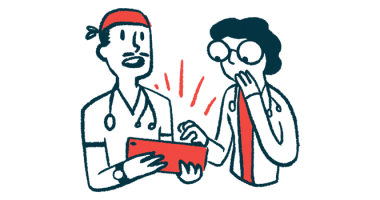Trial of EDG-5506, Becker MD Treatment, Begins Enrolling Patients
by |

A Phase 2 clinical trial testing Edgewise Therapeutics’ investigational oral therapy EDG-5506 is recruiting boys and men with Becker muscular dystrophy (BMD).
Called CANYON (NCT05291091), the study plans to enroll up to 66 BMD patients, ages 12–50, across 14 clinical sites in the U.S., U.K., and the Netherlands. Recruitment is currently open at the University of Massachusetts’ site; contact and location information to date is available.
“We are delighted to advance EDG-5506 into Phase 2, based on the safety and positive biomarker data observed in our Phase 1 and ARCH studies,” Joanne Donovan, MD, PhD, chief medical officer of Edgewise, said in a company press release. “In the CANYON trial, we aim to understand the effect of EDG-5506 on circulating biomarkers, muscle MRI, and functional measures, all of which could provide indications of a treatment effect.”
Brenda L. Wong, MD, the clinical director of the Duchenne Muscular Dystrophy Center at UMass Memorial Medical Center, added that “individuals with BMD and their families have been waiting for a while for clinical trials and it is indeed an exciting time to be a part of this trial.”
BMD, a milder form of Duchenne muscular dystrophy (DMD), is caused by mutations in the DMD gene. This gene provides the instructions to produce dystrophin, a protein that helps to protect muscle fibers from being damaged during movement.
Becker treatment shows potential in earlier trials
EDG-5506 works by specifically suppressing myosin — a protein involved in muscle contraction — in muscle fibers susceptible to contraction-driven damage in BMD and DMD due to dystrophin deficiency.
By selectively limiting contraction in susceptible muscle fibers, the therapy is expected to preserve muscle function in people with a broad range of rare neuromuscular disorders, according to Edgewise.
The new trial comes on the heels of promising early data from the one-year Phase 1 ARCH trial (NCT05160415), which is testing the therapy in 12 men with BMD.
Interim results showed that two months of treatment with EDG-5506 was generally well-tolerated and led to a significant drop in the average levels of two muscle damage biomarkers: fast skeletal muscle troponin I (by 68%) and creatine kinase (by 30%).
A previous Phase 1 trial (NCT04585464) showed the experimental therapy could rapidly and significantly reduce the levels of key biomarkers of muscle damage in men with BMD, closely approaching or reaching the normal range.
In the Phase 2 CANYON study, about 48 adults and 18 boys will be randomly assigned to one of five doses of EDG-5506 or to a matching placebo for one year, after which they will be followed for another four weeks.
The trial’s main goals are to assess EDG-5506’s safety and impact on the levels of creatine kinase. Secondary goals include the therapy’s pharmacokinetics (movement into, through, and out of the body) and changes in functional measures.
“BMD is a serious, progressive, debilitating neuromuscular disorder, which causes great hardship to individuals with BMD and their families and caregivers,” said Wong, who is also a professor of pediatrics and neurology at the University of Massachusetts Medical School.
“I look forward to working with fellow investigators and the BMD community on this Phase 2 trial of EDG-5506,” Wong added.
Edgewise expects to initiate a Phase 2 trial of EDG-5506 in people with DMD later this year. The therapy received fast track status from the U.S. Food and Drug Administration for this condition, which is meant to speed its clinical development and regulatory review.








